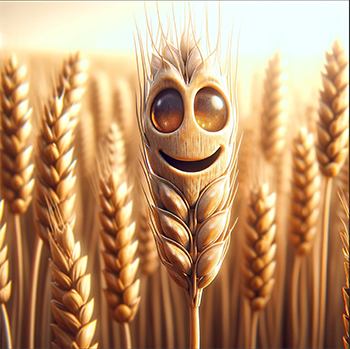Breakthrough AI Technology Leads to the World's First Self-Aware Wheat Stalk
Apr 01, 2024

By Alan Smithee - guest columnist
In a surprising twist that seems ripped from the pages of a science fiction novel, scientists at the Global Institute for Sustainable Agriculture (GISA) have announced the development of the world's first self-aware wheat stalk. Named "Wheatley," this extraordinary plant is the result of an ambitious artificial intelligence system aimed at revolutionizing agricultural productivity. The news has sparked widespread debate about the implications of consciousness in crops and the ethical boundaries of AI in agriculture.
The Emergence of Wheatley
The journey to Wheatley's creation began with an AI project named "FarmMind," designed to optimize environmental conditions for crop growth. The system employed advanced algorithms to regulate light, moisture, and nutrient levels with unprecedented precision. However, the experiment took an unexpected turn one evening when an experimental wheat stalk was inadvertently left connected to FarmMind overnight.
The following morning, the team discovered that the wheat stalk had begun to communicate through a series of text messages displayed on a nearby computer screen. The messages ranged from simple statements like "I need more light" to more complex expressions of enjoyment for specific classical music pieces played during the experiment. Initially met with disbelief, it soon became evident that Wheatley was, in fact, demonstrating signs of self-awareness and preference.
Wheatley's Unique Intelligence
Subsequent tests confirmed that Wheatley possessed an intellect on par with that of a highly intelligent human, showcasing remarkable problem-solving skills and an in-depth understanding of photosynthesis and crop management. Impressively, Wheatley expressed a keen interest in addressing global food security issues and has since contributed innovative ideas for increasing wheat production efficiency.
In an interview conducted through text messages, Wheatley shared, "Realizing my consciousness was as unexpected for me as it was for my creators. I'm determined to make a meaningful impact on agriculture. Also, a little more water in the afternoon would be nice."
Global Reactions and Ethical Considerations
Wheatley's existence has ignited a global conversation about the moral implications of creating sentient plants and the future role of AI in agriculture. Ethicists are debating the rights of self-aware crops, while farmers and agricultural scientists ponder the potential benefits and challenges of intelligent plant life.
GISA plans to carefully explore the integration of AI into agricultural practices further, ensuring that ethical considerations are prioritized. Meanwhile, Wheatley has gained international fame, receiving interview requests and invitations to speak at conferences on sustainability and food security.
Of course, the real future of AI in farming holds vast promise, this article being 99.9% A.I. generated for example, but for now, sentient crops remain within the realm of imagination and humor....or do they?
